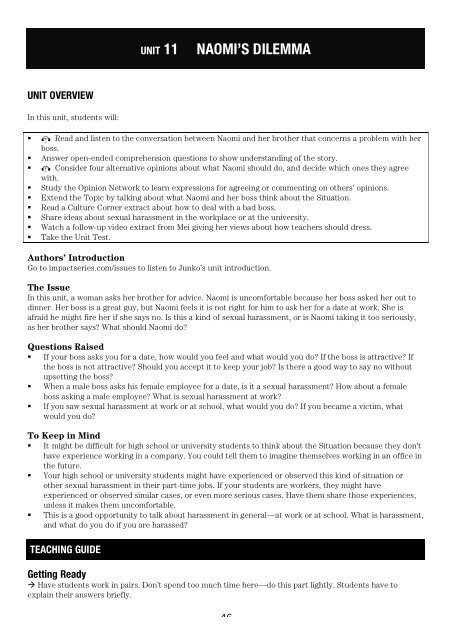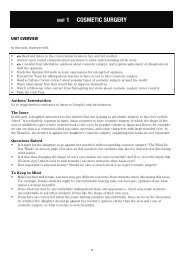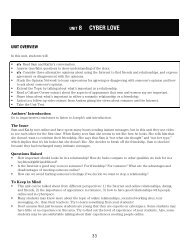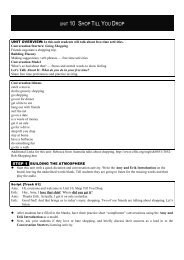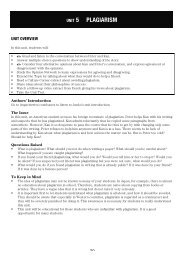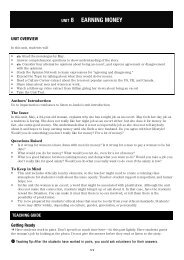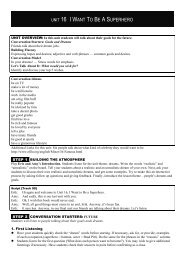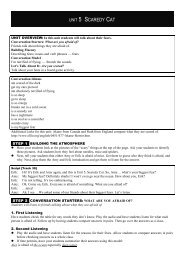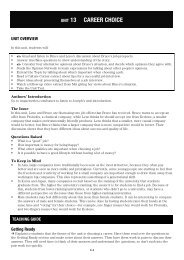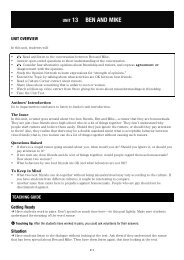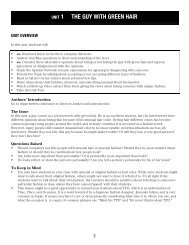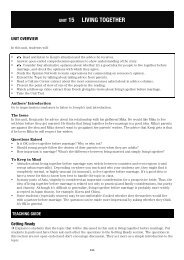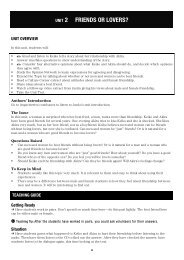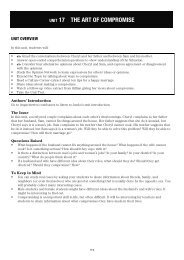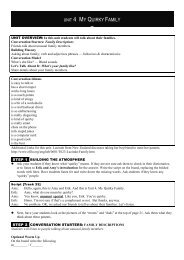UNIT 11 NAOMI'S DILEMMA - Impact Series
UNIT 11 NAOMI'S DILEMMA - Impact Series
UNIT 11 NAOMI'S DILEMMA - Impact Series
You also want an ePaper? Increase the reach of your titles
YUMPU automatically turns print PDFs into web optimized ePapers that Google loves.
<strong>UNIT</strong> <strong>11</strong><br />
NAOMI’S <strong>DILEMMA</strong><br />
<strong>UNIT</strong> OVERVIEW<br />
In this unit, students will:<br />
<br />
<br />
<br />
<br />
<br />
<br />
<br />
<br />
<br />
T Read and listen to the conversation between Naomi and her brother that concerns a problem with her<br />
boss.<br />
Answer open-ended comprehension questions to show understanding of the story.<br />
T Consider four alternative opinions about what Naomi should do, and decide which ones they agree<br />
with.<br />
Study the Opinion Network to learn expressions for agreeing or commenting on others’ opinions.<br />
Extend the Topic by talking about what Naomi and her boss think about the Situation.<br />
Read a Culture Corner extract about how to deal with a bad boss.<br />
Share ideas about sexual harassment in the workplace or at the university.<br />
Watch a follow-up video extract from Mei giving her views about how teachers should dress.<br />
Take the Unit Test.<br />
Authors’ Introduction<br />
Go to impactseries.com/issues to listen to Junko’s unit introduction.<br />
The Issue<br />
In this unit, a woman asks her brother for advice. Naomi is uncomfortable because her boss asked her out to<br />
dinner. Her boss is a great guy, but Naomi feels it is not right for him to ask her for a date at work. She is<br />
afraid he might fire her if she says no. Is this a kind of sexual harassment, or is Naomi taking it too seriously,<br />
as her brother says? What should Naomi do?<br />
Questions Raised<br />
If your boss asks you for a date, how would you feel and what would you do? If the boss is attractive? If<br />
the boss is not attractive? Should you accept it to keep your job? Is there a good way to say no without<br />
upsetting the boss?<br />
When a male boss asks his female employee for a date, is it a sexual harassment? How about a female<br />
boss asking a male employee? What is sexual harassment at work?<br />
If you saw sexual harassment at work or at school, what would you do? If you became a victim, what<br />
would you do?<br />
To Keep in Mind<br />
It might be difficult for high school or university students to think about the Situation because they don’t<br />
have experience working in a company. You could tell them to imagine themselves working in an office in<br />
the future.<br />
Your high school or university students might have experienced or observed this kind of situation or<br />
other sexual harassment in their part-time jobs. If your students are workers, they might have<br />
experienced or observed similar cases, or even more serious cases. Have them share those experiences,<br />
unless it makes them uncomfortable.<br />
This is a good opportunity to talk about harassment in general—at work or at school. What is harassment,<br />
and what do you do if you are harassed?<br />
TEACHING GUIDE<br />
Getting Ready<br />
Have students work in pairs. Don’t spend too much time here—do this part lightly. Students have to<br />
explain their answers briefly.<br />
46
m Teaching Tip: After the students have worked in pairs, you could ask volunteers for their answers.<br />
Situation<br />
Have students guess what kind of a problem Naomi has before listening to the audio. Then have them<br />
listen to the CD, without looking at the text, to find out the answer. After they have checked the answer, have<br />
students listen to the dialogue again, this time looking at the text.<br />
m Teaching Tip: Have students make pairs. One will read Naomi’s part, and the other, Tom’s part. They can<br />
hold their cell phones (if they have them) as props to make it more realistic. After all the pairs have read,<br />
have one pair volunteer to perform their conversation in front of the class.<br />
Check Your Understanding<br />
Answer Key (sample answers)<br />
1. She thought he was going to talk about a project.<br />
2. He wanted to ask her out.<br />
3. Because he might fire her if she said no.<br />
4. She liked him.<br />
5. Go out with the boss and see what happens.<br />
What Do You Think?<br />
After you check students’ understanding of the story using the comprehension questions, students discuss<br />
the opinions of Susan, Ken, Luis, and Yeon-Suk. Have students do Activity A individually. Then have them<br />
move to Activity B and share their opinions in pairs.<br />
m Teaching Tip: In the Opinion Network students can learn expressions for agreeing that don’t directly use<br />
the word agree.<br />
2 Culture Point: Thanks to the term sexual harassment, it is easier for women (and men) now to claim that<br />
certain offensive acts by bosses or colleagues are incidents of harassment. Before this term was introduced,<br />
many women (and men) who were harassed could not identify the incidents as harassment, and it was<br />
difficult for them to make people understand their problems. In Japan sexual harassment is called sekuhara.<br />
Thanks to this word, there is now understanding throughout the nation about sexual harassment, and there<br />
are laws to prevent it.<br />
Extending the Topic: Business dinner or date?<br />
Have students work individually when writing R (right) or W (wrong) in the chart, and in pairs (or threes)<br />
for the follow-up discussion. Students can use the opinions in the chart above, but they can be<br />
encouraged to go further than what’s in the chart, using their own words and expressions.<br />
Do the Extra Activity (role play) if there is time.<br />
Culture Corner<br />
Have students work in pairs or groups of three. Students read through the list of ways to deal with a “bad<br />
boss.” Give them an opportunity to ask about unknown words such as compile, mentor, and sacrifice. You can<br />
ask for students’ general reaction to the list, or write a few questions on the board for discussion in pairs. For<br />
example: Do you agree with these points of advice? Why or why not? How would you deal with a “bad boss”?<br />
Extra Activity: Role Play<br />
If there is time, consider doing the Extra Activity, a role play. Set up the role play by dividing the class into<br />
groups of three. One member of each group (student A) is a “mediator” who listens to both Naomi and her<br />
boss and tries to understand the situation as objectively as possible. Another (student B) is Naomi. The third<br />
student (student C) is Naomi’s boss.<br />
Give the students a few minutes to prepare their role play. They can look over the Situation and the<br />
Extending the Topic activity, and write expressions they may want to use in their role play. Give the students<br />
about two minutes to act out their role play. Then you can ask for volunteer pairs to act out their role play in<br />
front of the class. As a variation, you can have “Naomi” and “the boss” talk to each other directly to explain<br />
their motivation and their response to the situation.<br />
47
Sharing My Ideas: Sexual harassment<br />
Choose<br />
Begin by having students read the two situations. Briefly discuss the situations as a class to be sure everyone<br />
understands what each problem is. To help them choose, explain that they are going to give a presentation<br />
about what either Mariko or Shen should do.<br />
Prepare and Rehearse<br />
Have students use the Speaking notes and Language Hints to prepare their presentations. Remind them to<br />
take organized, simple notes.<br />
When they are ready to rehearse, have them work with a partner who chose the same situation. Point out the<br />
Listener task and be sure to allow enough time for students to help each other improve their outlines.<br />
Sample Presentation<br />
I chose Situation B. I think this is sexual harassment. The professor should not ask just one student to go to<br />
coffee. It would be difficult for Shen to say no to her because she is his teacher and a respected professor.<br />
Next time she asks Shen to go to coffee, he should ask if he can invite other students too. He should tell her<br />
that he is sure other students would want to have coffee with her, because they like her and respect her.<br />
They would be thrilled to have time with her. Then it would be difficult for her to say no. To sum up, I think<br />
this is the best way to solve the problem, because no one would get hurt.<br />
Present<br />
Have students find a partner who chose the alternate situation, or put them in small groups. Ask a volunteer<br />
to read the Presentation Tip. You could add that note-taking is another step to becoming a good listener. Be<br />
sure that students have read and understood the Listener task before beginning the presentations.<br />
If you are using the assessment guide below, go over each point with the whole class before students begin<br />
their presentations. (This could also be done during the Rehearse step so that students have time to prepare<br />
for or practice each assessment point.) Be sure to remind your students that communicating their ideas is<br />
more important than trying to use perfect English!<br />
Assessing the Activity<br />
Create a handout with a rating grid such as the one below, or simply write it on the board. (Note: For more<br />
information on student assessment and ways to modify the assessment system, see Assessing the Activity,<br />
Unit 1.)<br />
1 – The presentation was well organized.<br />
2 – The presenter used the Language Hints.<br />
3 – The presenter offered a clear solution to the problem.<br />
4 – The presenter spoke clearly.<br />
5 – The presenter did not read word for word from the page.<br />
When students are working in pairs, have each student evaluate the other. If a student presents in front of a<br />
small group or in front of the class, have each student evaluate him or her. A rater can give up to 5 stars for<br />
each category, so the maximum score for any presentation is 25 stars.<br />
Of course, you can also give your own assessment, along with positive suggestions for how the presenter can<br />
improve next time.<br />
PERSONAL OPINION<br />
If you have downloaded the video clip or have access to the Internet in class, play the video clip. The first<br />
time, have the students watch with books closed. Ask questions to see if the students have understood the<br />
gist of Mei’s opinion. Then have them look at the summary. See if they can fill in the missing words. Play the<br />
extract once or twice more. Then check the answers.<br />
48
Answer Key<br />
Mizuki<br />
I agree with her brother. I don’t really think it’s such a big deal. Of course, I do understand that she doesn’t<br />
feel very comfortable in this situation. She wants to separate her personal life from her professional life. And,<br />
practically speaking, if they date and then they break up, things at work could get very difficult.<br />
One problem is that she doesn’t know him very well. At the office, he might be nice and polite, but dating is a<br />
whole different thing. She’s not sure if she’ll like him in that way. So what I would do is go out for coffee with<br />
him and talk about things and then see how they feel about each other. That way, she’s not completely<br />
rejecting him, and he won’t feel that bad. And she might even like him more than she thought she would. Who<br />
knows?<br />
Video Script<br />
Basically, I agree with her brother. It’s not that big of a big deal. But I do understand that she doesn’t feel very<br />
comfortable. Maybe because she doesn’t think that’s very professional. Or she wants to separate her personal<br />
life from her professional life. In fact, if they date and they break up, things could be very difficult at work.<br />
The problem is she doesn’t know him that well. She thinks he’s nice and polite, but dating is a whole different<br />
thing. And she’s not sure if she likes him that, in that way. So what I would do is have a coffee with him and<br />
talk about things and have, see how they feel about each other. So that way, she’s not completely rejecting<br />
him, and he won’t feel bad. She might even like him more than she thought. Who knows?<br />
<strong>UNIT</strong> TEST<br />
Make copies of the Unit Test for each student. Distribute the copies and allow about 15 minutes for the<br />
class to complete the test. Correct the test in class.<br />
A. Understanding the Situation: The focus is on understanding the problem that Naomi is having at work and<br />
the advice that her brother gives her.<br />
B. Vocabulary: The focus is on words or phrases from the Situation or the Extending the Topic sections.<br />
Students fill in three missing words of a short paragraph that summarizes the Situation.<br />
C. Expressions: The focus is on checking students’ understanding of the What Do You Think? and Opinion<br />
Network sections.<br />
Answer Key<br />
A. 1. c 2. b 3. a 4. d 5. b<br />
B. uncomfortable, work, fire<br />
C. 1. c 2. a<br />
LINKS<br />
If you would like the class to do additional research on sexual harassment, here are some useful links:<br />
The U.S. Equal Employment Opportunity Commission: sexual harassment<br />
http://www.eeoc.gov/types/sexual_harassment.html<br />
Sexual harassment support:<br />
http://www.sexualharassmentsupport.org/index.html<br />
Harassment and sexual harassment in the workplace:<br />
http://humanresources.about.com/od/glossarys/a/sexualharassdef.htm<br />
49


